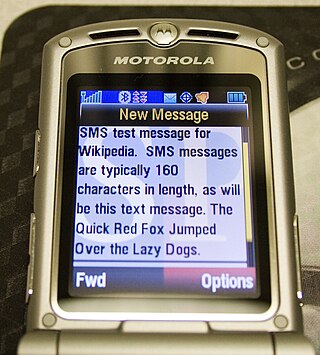
Short Message/Messaging Service, commonly abbreviated as SMS, is a text messaging service component of most telephone, Internet and mobile device systems. It uses standardized communication protocols that let mobile devices exchange short text messages. An intermediary service can facilitate a text-to-voice conversion to be sent to landlines.
Short Message Peer-to-Peer (SMPP) in the telecommunications industry is an open, industry standard protocol designed to provide a flexible data communication interface for the transfer of short message data between External Short Messaging Entities (ESMEs), Routing Entities (REs) and SMSC.
Multimedia Messaging Service (MMS) is a standard way to send messages that include multimedia content to and from a mobile phone over a cellular network. Users and providers may refer to such a message as a PXT, a picture message, or a multimedia message. The MMS standard extends the core SMS capability, allowing the exchange of text messages greater than 160 characters in length. Unlike text-only SMS, MMS can deliver a variety of media, including up to forty seconds of video, one image, a slideshow of multiple images, or audio.
External Machine Interface (EMI), an extension to Universal Computer Protocol (UCP), is a protocol primarily used to connect to short message service centres (SMSCs) for mobile telephones. The protocol was developed by CMG Wireless Data Solutions, now part of Mavenir.
Network switching subsystem (NSS) is the component of a GSM system that carries out call out and mobility management functions for mobile phones roaming on the network of base stations. It is owned and deployed by mobile phone operators and allows mobile devices to communicate with each other and telephones in the wider public switched telephone network (PSTN). The architecture contains specific features and functions which are needed because the phones are not fixed in one location.
A value-added service (VAS) is a popular telecommunications industry term for non-core services, or, in short, all services beyond standard voice calls and fax transmissions. However, it can be used in any service industry, for services available at little or no cost, to promote their primary business. In the telecommunications industry, on a conceptual level, value-added services add value to the standard service offering, spurring subscribers to use their phone more and allowing the operator to drive up their average revenue per user. For mobile phones, technologies like SMS, MMS and data access were historically usually considered value-added services, but in recent years SMS, MMS and data access have more and more become core services, and VAS therefore has begun to exclude those services.
A Short Message Service Center (SMSC) is a network element in the mobile telephone network. Its purpose is to store, forward, convert and deliver Short Message Service (SMS) messages.

Comverse Technology, Inc., often referred to as simply Comverse, was a technology company located in Woodbury, New York in the United States, that developed and marketed telecommunications software. The company focused on providing value-added services to telecommunication service providers, in particular to mobile network operators. Comverse Technology had several wholly or partly owned subsidiaries. The name "Comverse" is a fusion of the words "communication" and "versatility".

A Push Proxy Gateway is a component of WAP Gateways that pushes URL notifications to mobile handsets. Notifications typically include MMS, email, IM, ringtone downloads, and new device firmware notifications. Most notifications will have an audible alert to the user of the device. The notification will typically be a text string with a URL link. Note that only a notification is pushed to the device; the device must do something with the notification in order to download or view the content associated with it.
Short codes, or short numbers, are short digit sequences, significantly shorter than telephone numbers, that are used to address messages in the Multimedia Messaging System (MMS) and short message service (SMS) systems of mobile network operators. In addition to messaging, they may be used in abbreviated dialing.
Mobile marketing is a multi-channel online marketing technique focused at reaching a specific audience on their smartphones, feature phones, tablets, or any other related devices through websites, e-mail, SMS and MMS, social media, or mobile applications. Mobile marketing can provide customers with time and location sensitive, personalized information that promotes goods, services, appointment reminders and ideas. In a more theoretical manner, academic Andreas Kaplan defines mobile marketing as "any marketing activity conducted through a ubiquitous network to which consumers are constantly connected using a personal mobile device".
The telecommunications industry in China is dominated by three state-run businesses: China Telecom, China Unicom and China Mobile. The three companies were formed by restructuring launched in May 2008, directed by the Ministry of Information Industry (MII), National Development and Reform Commission (NDRC) and the Minister of Finance. Since then, all three companies gained nationwide fixed-line and cellular mobile telecom licenses in China. In 2019, all three telecoms were issued 5G national licenses.
An SMS gateway or MMS gateway allows a computer to send or receive text messages in the form of Short Message Service (SMS) or Multimedia Messaging Service (MMS) transmissions between local and/or international telecommunications networks. In most cases, SMS and MMS are eventually routed to a mobile phone through a wireless carrier. SMS gateways are commonly used as a method for person-to-person to device-to-person communications. Many SMS gateways support content and media conversions from email, push, voice, and other formats.
Aldiscon Limited was a telecommunications software company founded in Dublin, Ireland, in 1988. The company supplied software products to mobile phone operators and became a leader in the supply of short message service centres (SMSC).
TeleMessage is an Israeli software company based in Petach Tikva, Israel. The company was founded in 1999 by Guy Levit and Gil Shapira. It provides secure enterprise messaging, mobile communications archiving and high-volume text messaging services.

Ribbit was a telecommunications company based in Mountain View, California. It was acquired by BT Group on July 29, 2008 for $105 million.
The MMS Architecture is the set of standards used by the Multimedia Messaging Service in mobile networks. The standards are prepared by 3GPP.

HRMavenir Systems, Inc. dba Mavenir is an American telecommunications software company, created in 2017 as a result of a three-way merger of existing companies and technologies, that develops and supplies cloud-native software to the communications service provider (CSP) market.

Sinch, formerly CLX Communications, is a telecommunications and cloud communications platform as a service (PaaS) company. Headquartered in Stockholm, Sweden, Sinch also has offices in over 30 cities worldwide, including Atlanta, London, Madrid, San Francisco, Singapore and Sydney.
Xura, Inc. , previously known as Comverse, Inc., was a technology company headquartered in Wakefield, Massachusetts, United States, in existence from 2013 to 2017, that offered a portfolio of digital services which enabled global communications across a variety of mobile devices and platforms. Xura marketed and sold to communications service providers (CSPs) and to enterprises.





